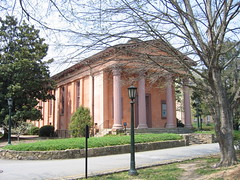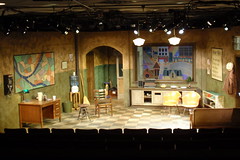Folk Plays
Get Off Your Seat and Up on That Stage
by Nancy Pennington, edited by Government & Heritage Library Staff.
Reprinted with permission from The Tar heel Junior Historian, Fall 2009.
Tar Heel Junior Historian Association, NC Museum of History
 Starting in the 1920s, a burst of play-writing and acting creativity began in Chapel Hill and spread across the state. Professor Frederick Koch came to the University of North Carolina at Chapel Hill in 1918 for a special purpose: to get students there to write plays and act them out, not just to sit and watch. He’d been doing this at the University of North Dakota when Edwin Greenlaw and E. K. Graham came calling. One was head of the English Department, and the other served as the president of the university, and they believed that the school should help the state grow. Koch, they thought, would make a good partner in that effort.
Starting in the 1920s, a burst of play-writing and acting creativity began in Chapel Hill and spread across the state. Professor Frederick Koch came to the University of North Carolina at Chapel Hill in 1918 for a special purpose: to get students there to write plays and act them out, not just to sit and watch. He’d been doing this at the University of North Dakota when Edwin Greenlaw and E. K. Graham came calling. One was head of the English Department, and the other served as the president of the university, and they believed that the school should help the state grow. Koch, they thought, would make a good partner in that effort.
Koch called his student actors the Playmakers and their plays “folk plays.” While“folk” means “people,” Koch didn’t have just any kind of people in mind. He meant farmers and others who didn’t live in big cities. He called them the “big family of country folk” who “took pleasure in simple things.” Like other professors and writers of the time, Koch saw places like North Carolina (with lots of farms but not many towns) as gold mines of stories. He believed that people there lived as their parents, grandparents, and great-grandparents had lived, sharing a common way of life that the rest of the world was forgetting. By writing about “the folk,” Koch thought, his students could show what was being lost.
Most Carolina folk plays tended to be pretty short—about thirty to forty-five minutes—and could be called either a comedy (really funny) or a tragedy (very sad). But whether the stories made audience members laugh or cry, the Playmakers promised that people could “Come see yourselves!”
And this was Rule No. 1, the most important, absolutely, positively gotta-have-it part of folk drama the Carolina way: Write about things you know. Open your eyes, Professor Koch would say. Right there in your home is a play. All you need to do is see it and write it down.
Here’s an example. In 1921 Wilbur Stout came to class with a story he had just heard at home in Burlington. A boy liked a girl, and she liked him back. The girl’s father didn’t like the boy at all. So, how could the two see each other? Humorously, it involved lots of jumping around and falling out of windows.
 Wilbur wrote his play by working with other students. He told the story to his classmates and Professor Koch, and they made many suggestions. Wilbur wrote and rewrote, and he came up with a play he called In Dixon’s Kitchen.
Wilbur wrote his play by working with other students. He told the story to his classmates and Professor Koch, and they made many suggestions. Wilbur wrote and rewrote, and he came up with a play he called In Dixon’s Kitchen.
After the play was completed, the students voted. A group of students read In Dixon’s Kitchen, along with other plays written in the class, and voted for three that they wanted to produce. They had just three weeks to design and build sets, make costumes, and practice their lines.
The audiences were given the opportunity to vote in their own way. People in the audience got to say what they liked and didn’t like about the plays they saw. Professor Koch called this discussion “a friendly autopsy.” (An is the taking apart of something, usually a dead body, to figure out the cause of death or what happened.)
At least once, the comedy kept going offstage. In 1920 Hubert Heffner wrote Dod Gast Ye Both! A Comedy of Mountain Moonshiners. He based the play on people he knew near Grandfather Mountain. The Playmakers used a real prop, or stage object, during the show: an eighty-gallon copper still that the Orange County sheriff had taken from some local moonshiners. (Moonshiners made alcoholic beverages illegally.) The “prop” got stolen by folks wanting to put it back into service.
A situation could be both a comedy and a tragedy depending on how the author wrote it. Two characters from two Playmakers plays, Magnolia and Peggy, wanted the same thing: to get married. Magnolia’s adventures in love were funny, and she ended up with two men to choose from (she chose the boy next door). But things didn’t turn out well for Peggy. The daughter of a poor man, she had her heart set on the landowner’s son but ended up marrying a fellow farmworker to keep a roof over her family’s head. (These are the plots from Magnolia’s Man, 1929, by Gertrude Wilson Coffin, and Peggy, Tragedy of the Tenant Farmer, 1919, by Harold Williamson.)
The Playmakers didn’t just stay on campus. They took their plays all over North Carolina, traveling by train or driving a bus over dirt and gravel roads and camping out. They even went to twelve other eastern states, from Georgia to New York—stuffing scenery, costumes, props, and lighting for three plays, plus the actors and their luggage, into one bus. Sometimes Koch rode on top of the bus, where it was cooler. On at least one tour, so did an actor carrying a big prop rifle, which brought the Playmakers plenty of attention when they rolled into town.
Koch and the Playmakers didn’t just write and perform in Chapel Hill. They helped people in schools and clubs across the state produce their own plays. They even loaned out costumes and makeup. The Playmakers, with the university’s support, also started a statewide theater club with a yearly festival that drew college and high school drama clubs to Chapel Hill for four days of play performances and workshops. This program lasted for many years. In time, people who had gone to the first festivals saw their children and their grandchildren take their turns onstage.
Some of the clubs performed their own works. Others used “store-bought” plays like those from the numerous folk drama books Koch edited. While in Chapel Hill, students eagerly signed up for workshops in costume making, acting, writing, lighting, and other drama topics. The festivals proved popular—in 1939 a group of kids from Asheville were so eager to attend the festival that they sold handkerchiefs on the street to pay for the trip.
People came from other parts of the country, and then other countries, to learn to write folk dramas and produce them in the Playmakers way. “Proff” Koch never stopped preaching the joy of writing what you knew—in lectures, articles, and books. Some said his nickname was short for prophet, as well as professor. (A prophet is a person, often a religious leader, who tells what will happen in the future.) After Koch’s death in 1947, the Theater Department at UNC-Chapel Hill shifted away from folk dramas, but “folk” still live onstage off the coast of North Carolina. Every summer, crowds come to see The Lost Colony, the longest-running outdoor drama in the United States—and a play written by one of the most famous Playmakers, Paul Green.
Additional Resources:
Carolina Folk-Plays by Frederick Koch. http://www.questia.com/PM.qst?a=o&d=9413954
UNC Playmakers: http://www.playmakersrep.org/
Virtual Tour of Playmaker's Theater: https://www.unc.edu/interactive-tour/landmarks/landmark-playmakers-theatre
Image Credits:
Shepard, David. April 11, 2004. "Playmaker Theater, UNC/Chapel Hill." Located at https://www.flickr.com/photos/shepdave/122201242/. Accessed February 23, 2012.
Rae Z/A. April 30, 2009. "0430- Under the Lights". Located at https://www.flickr.com/photos/rszalley/3502619001/. Accessed February 23, 2012.
1 January 2009 | Pennington, Nancy